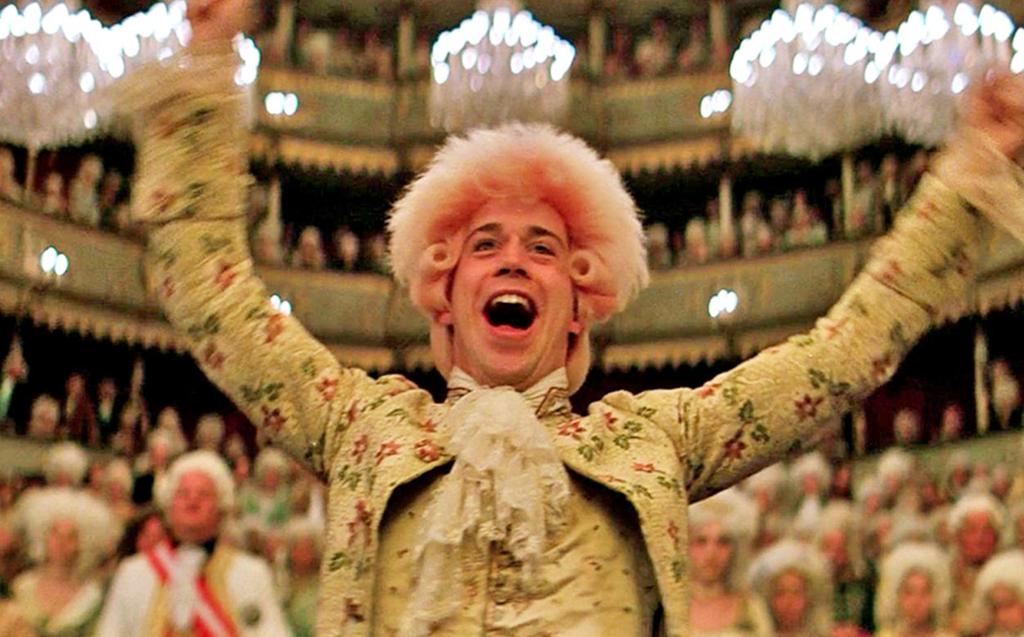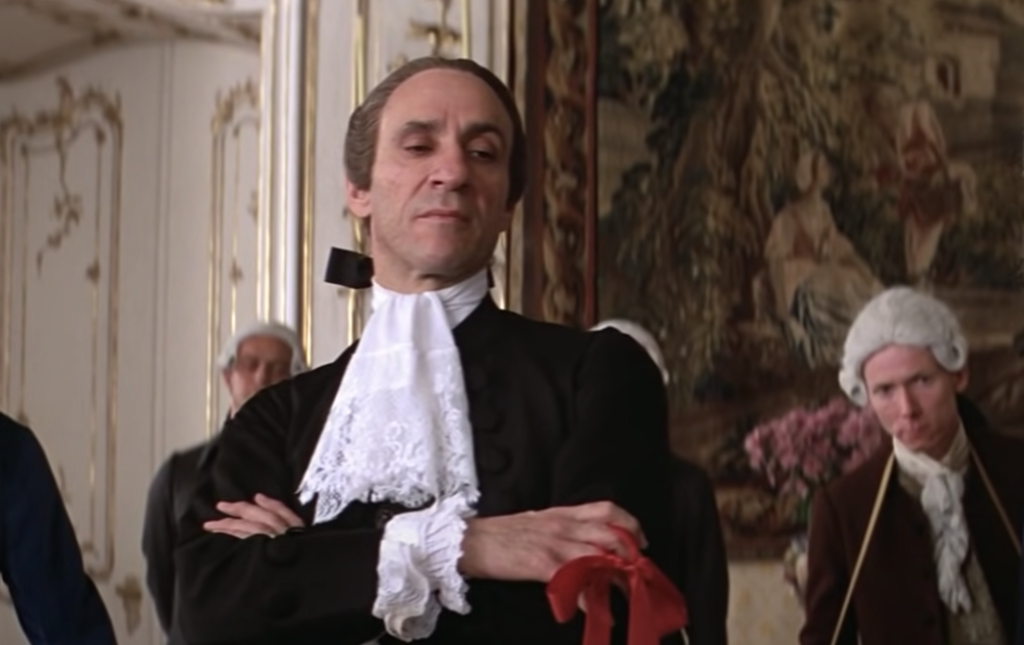Director: Miloš Forman
Writers: Peter Shaffer, Zdenek Mahler
Stars: F. Murray Abraham, Tom Hulce, Elizabeth Berridge
Synopsis: The life, success, and troubles of Wolfgang Amadeus Mozart, as told by Antonio Salieri, the contemporaneous composer who was deeply jealous of Mozart’s talent and claimed to have murdered him.
It’s possible that there will be a big budget film about the life of Wolfgang Amadeus Mozart. It will have lavish costumes, themes of the destruction of true art by commerce, and a sob worthy death scene at the end. It will be as true to life as a story of someone who lived nearly three hundred years ago could be. But it won’t hold a candelabra to the truly impeccable genius that is Amadeus.

Amadeus is not a biopic, but one of the best tales of a sniveling, talentless, mediocrity tearing down a genius from behind the scenes. Mozart (Tom Hulce) is a braying, womanizing, childish prodigy instead of a revered young composer. Salieri (F. Murray Abraham) is a conniving, power hungry, sycophantic, pious prude instead of a revered contemporary of Mozart. These two men are shifted and molded into something new that makes for so much more fabulous viewing than any stodgy period piece has any right to be.
The film, based on co-writer Peter Shaffer’s play, is so deviously clever. The script provides answers to questions people have stopped asking and it fills in the details of a life that has become a staple of backhanded musical praise (“Well, they’re no Mozart, but…”). These details are far more interesting and compelling than the truth could ever be. As written by Shaffer (and, uncredited co-writer Zdenek Mahler), Mozart’s final, unfinished requiem is given a text. Mozart’s deep seeded issues with his father and his need of money as he goes further and further into debt are exploited by the man who secretly hates him in order to drive him mad and push him beyond his physical limits.
Yet, without editors Nena Danevic and Michael Chandler’s incredible eyes for detail, the script wouldn’t sing as sweetly as it does. There are tremendous wide shots of the spectacularly staged operas by cinematographer Miroslav Ondrícek, but it’s the closeups on Mozart as he conducts that are the most beautiful. When paired with Danevic and Chandler’s superb editing, these opera scenes are the perfect combination of cutting, music, and action. It’s almost a call and response in some scenes. The cuts are quick from singer to conductor to singer to conductor again, but they move as the piece progresses. Each piece flows with the music and action of the scene portrayed within the film. It’s like a perfect melody, everything meshes to create something tonally and visually beautiful.
All the marvelous behind the camera wizardry of the film simply wouldn’t work without the twin pillars of Tom Hulce and F. Murray Abraham, though. These two men have created utterly indelible screen performances. Tom Hulce not only brings the joy and goofiness of Mozart to life (that laugh!), he finds the depth of the clown as well. His balance of buffoonery and drama is delicately subtle. It’s in the slight downturn of his impish grin, the slowing of the manic wildness of his creative fervor, and the lack of the braying laugh that show that shift in tone. It’s a performance that could have run away with the film.

Hulce’s performance is tempered, matched and at some points exceeded by the indomitable performance of F. Murray Abraham. He plays the stuffed shirt Salieri with the posture and bearing of a man who swings high above his station. Yet, he also has moments where he can no longer control his yearning for the divine. He stares at Mozart conducting his operas with an almost voyeuristic zeal like he’s watching an intimacy not meant for his eyes. A lot of Salieri’s feelings are pseudosexual in this way.
In an early scene, Salieri is left alone with Mozart’s score for the piece Mozart had prepared for his benefactor. Salieri approaches it and feels the music welling up in himself as if he’s building to a sexual climax that he’s denied himself his entire life and as he’s on the precipice, Mozart himself snatches the score away. This feeling and this building is seen again later as Stanzi (Elizabeth Berridge) comes to Salieri begging on behalf of her husband, Mozart. He looks through the music she’s brought, salivating over it like it’s something explicit. He flips through the pages, hearing the music, flipping more furiously until he finally achieves something like an orgasm as he spills the music on the floor with the divinity inherent in Mozart’s music washing over him.
Abraham plays these scenes so well, letting Salieri’s mask slip. Abraham plays it up even further with Salieri as a man finally able to find a sensual partner who understands his needs as Mozart dictates the music of the requiem to him. He’s giddy with the anticipation of the next line, the mystery of the music coming whole and masterfully from Mozart’s weary head. Abraham’s playfulness and joy isn’t at odds, but complementary of the stuck up man he plays in mixed company.
Amadeus is an anti-biopic, in a way. The film doesn’t purport to be a true story, but it uses real life figures in a way that makes their lives far more interesting to watch. If it were a, based on a true story, type of film, it would have taken a few liberties, sure, but in this way, Amadeus is free to be compelling, bombastic, and enthralling in a way many true stories just aren’t. Amadeus is a brilliant film with spectacular acting, a score that you will immediately recognize, and lush visuals that keep your eyes glued to the screen. If you have the chance, seek out the director’s cut, the extra 20 minutes are well worth it.





